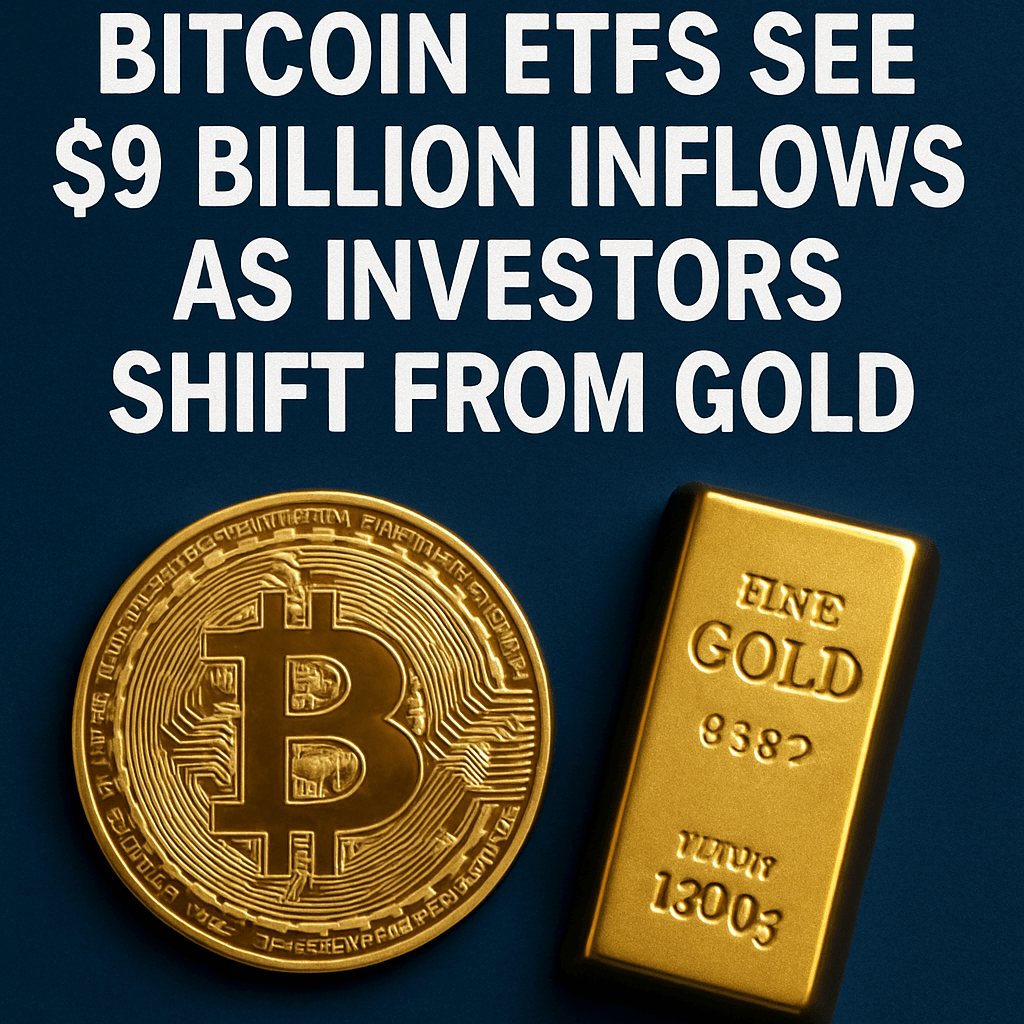Bitcoin ETFs See $9 Billion Inflows as Investors Shift from Gold

Recent trends in the Bitcoin exchange-traded funds (ETFs) market exhibit a notable shift in investor sentiment. Funds are increasingly flowing into BTC ETFs while gold-backed funds experience substantial outflows, indicating a changing landscape of perceived safe-haven assets.
Bitcoin ETFs Emerge As Preferred Safe Haven
According to a recent report from Bloomberg, US Bitcoin ETFs have seen an influx surpassing $9 billion in the last five weeks, significantly influenced by the launch and subsequent performance of BlackRock Inc.’s iShares Bitcoin Trust ETF (IBIT). This surge is particularly noteworthy given the simultaneous outflows exceeding $2.8 billion from gold-backed ETFs during the same period.
Market Dynamics and Investor Behavior
This shift reflects a larger trend where traditional safe havens, like gold, are losing their luster amid easing trade tensions and a strengthening U.S. dollar. Investors are growing more confident in Bitcoin as an alternative store of value, especially in light of increasing concerns surrounding U.S. fiscal stability and monetary policy.
Additionally, Bitcoin recently achieved a record price of $111,980, boosted by favorable regulatory developments and rising macroeconomic uncertainty. This stands in contrast with gold, which, although up more than 25% year-to-date, is trading roughly $190 below its all-time high.
BTC’s Advantages Over Gold
Analysts are interpreting this rotation toward Bitcoin ETFs as a growing acceptance of cryptocurrency as a legitimate hedge within investment portfolios. Christopher Wood, global equity strategist at Jefferies, remarked on the efficacy of both gold and Bitcoin as hedges against currency debasement, particularly in G7 nations. However, he highlighted the volatility of Bitcoin as a critical factor that still raises questions about its capacity to function as a safe haven asset.
Risks and Volatility Concerns
While traditional safe-haven assets like gold tend to maintain stability during market turbulence, Bitcoin has displayed a tendency to experience sharp declines during macroeconomic crises. Historical contexts, such as the 2020 pandemic market crash, illustrate Bitcoin’s correlation with riskier assets. Despite this, proponents argue that Bitcoin’s decentralized nature provides a significant advantage over gold, especially during episodes of systemic financial risks.
Geoff Kendrick, global head of digital assets research at Standard Chartered, pointed out that Bitcoin serves as a hedge against specific risks, including troubles within the private sector, like the collapse of Silicon Valley Bank in 2023, and government-related concerns such as the stability surrounding U.S. Treasury policies.
Regulatory Impact and Market Sentiment
The evolving regulatory landscape is also playing a crucial role in shaping investor sentiment. Regulatory bodies in the U.S. are starting to take a more accommodating stance toward cryptocurrencies, incentivizing institutional investment. Moreover, threats to the Federal Reserve’s independence and potential tariff escalations regarding U.S. trade policies reinforce Bitcoin’s position as a hedge against inflation and economic instability.
Decreasing Correlations and Changing Perceptions
Bitcoin appears to be distancing itself from its previous reputation as merely a speculative risk asset. Research strategist Dilin Wu at Pepperstone has noted a significant decrease in Bitcoin’s intraday correlation with major indices such as the Nasdaq, along with the U.S. dollar and gold. This development signals a potential evolution in how Bitcoin is perceived in the investment community.
As fiscal pressures mount, exemplified by Moody’s recent downgrade of the U.S. credit rating from its last triple-A status, the discourse surrounding asset allocation is intensifying. Investors are reevaluating their portfolios, leading to increased interest in Bitcoin as a resilient alternative.
Conclusion: A Divergent Path Ahead
Despite Bitcoin’s recent rise in popularity and investor interest, gold continues to outshine its performance on a year-to-date basis, with gains of around 25% compared to Bitcoin’s increase of approximately 15%. As we navigate through shifting market dynamics, both assets will play crucial roles in diversifying investment portfolios and acting as hedges against various forms of risk.
As the discourse around fiscal responsibility and potential instability escalates, Bitcoin’s unique characteristics may redefine its position in the financial ecosystem, establishing it as a legitimate complement, if not an alternative, to traditional assets like gold.
Source: newsbtc